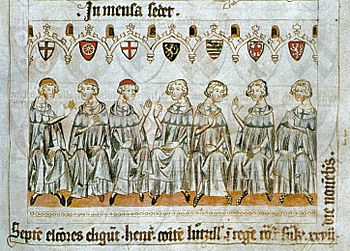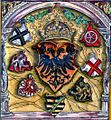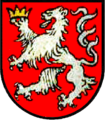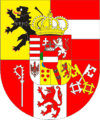Prince-elector facts for kids
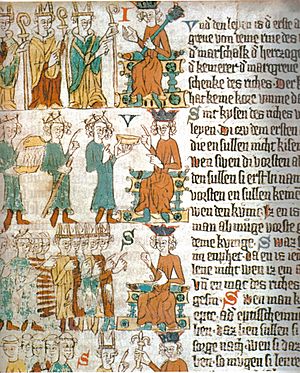
The Prince-electors (German: Kurfürst (), pl. Kurfürsten, Czech: Kurfiřt, Latin: Princeps Elector) of the Holy Roman Empire, or Electors for short, were the members of the electoral college that elected the Holy Roman Emperor.
From the 13th century onwards, the Prince-Electors had the privilege of electing the monarch who would receive the Papal coronation. After 1508, the election was sufficient to acquire the Imperial title. Charles V was the last person to be a crowned Emperor (elected 1519, crowned 1530); his successors were only elected Emperors by the electoral college, each being titled "Elected Emperor of the Romans" (German: erwählter Römischer Kaiser; Latin: electus Romanorum imperator). In practice, every emperor from 1440 onwards (except for Charles VII and Francis I) came from the Austrian House of Habsburg, and the Electors merely ratified the Habsburg succession.
The dignity of Elector carried great prestige and was considered to be second only to that of King or Emperor. The Electors had exclusive privileges that were not shared with the other princes of the Empire, and they continued to hold their original titles alongside that of Elector. The heir apparent to a secular prince-elector was known as an electoral prince (German: Kurprinz).
Images for kids
-
The emperor Maximilian surrounded by shield of electorates
-
Kingdom of Bohemia. The white lion bears in his right paw a simple crown symbolizing the King of Bohemia as imperial Arch Cupbearer presenting it to the Emperor. Restored directly from Medieval, hand-drawn armorials.
-
In 1777, the number of Electors dropped from nine to eight, until 1803, when Württemberg was raised to an electorate by Napoleon, while the prince himself was elevated from Standard-Bearer (Bannerherr) to Arch-Standardbearer.
-
Grand Duchy of Salzburg was added in 1803. After it was mediatized to Austria in 1805, its electoral vote was transferred to Würzburg. Salzburg and Würzburg were ruled by the same person, Ferdinand III.
See also
 In Spanish: Príncipe elector para niños
In Spanish: Príncipe elector para niños


